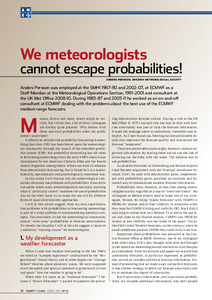Por favor, use este identificador para citar o enlazar este ítem:
http://hdl.handle.net/20.500.11765/7276
We meteorologists cannot escape probabilities!
| Título : | We meteorologists cannot escape probabilities! |
| Autor : | Persson, Anders |
| Palabras clave : | Ensemble prediction; Probability forecasting; Forecast uncertainties; Statistical methods |
| Fecha de publicación : | 2014 |
| Editor: | Asociación Meteorológica Española |
| Citación : | Tiempo y clima. Abril 2014, 5(44), p. 38-43 |
| Versión del editor: | https://pub.ame-web.org/index.php/TyC/issue/view/24 |
| Resumen : | The introduction of the ENS in 1992 was seen as a paradigm shift in operational weather forecasting by introducing probability forecasts. But probability forecasting had been around for almost 100 years, so perhaps the real paradigm shift was rather the introduction around 1980 of the ECMWF high-resolution deterministic 10-day forecast system (HRES) which gave the illusion about exact, confident and detailed weather forecasts. The weather forecasting problem remains, however, a probabilistic matter, whether we “like” it or not. The question is to find ways to handle this problem waiting for the realization of “Laplace Demon” in a very distant future. In the meantime we have to acknowledge uncertainty. It is argue in this article that forecast uncertainty information is a win-win product: it increases the value of the forecast and it gives the forecasters opportunities to display their skill, experience and knowledge, which make people trust the forecasts. Because, as Alan Murphy used to emphasize, even if a forecasts is very accurate with no uncertainties, if it is not trusted, it will serve no purpose. |
| URI : | http://hdl.handle.net/20.500.11765/7276 |
| ISSN : | 1696-764X |
| Colecciones: | Revista AME 2010-2015 |
Ficheros en este ítem:
| Fichero | Descripción | Tamaño | Formato | ||
|---|---|---|---|---|---|
| TyC_2014_44 (1).pdf | 159,74 kB | Adobe PDF |  Visualizar/Abrir |
Los ítems de Arcimis están protegidos por una Licencia Creative Commons, salvo que se indique lo contrario.





